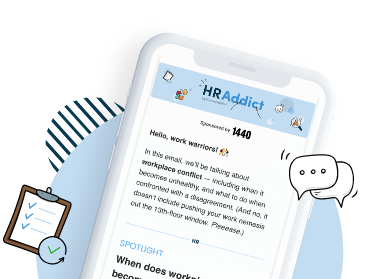Where can you source the right candidates for your roles? This is a question I often asked myself over the years when growing our team.
If you don’t already have the necessary talent for your new vacancy internally, you may decide to recruit externally.
With so many different external recruitment methods open to you to attract top talent, selecting the right one to provide you with the best candidates for your vacancy and for your business can be challenging.
In this article, I examine some of the most popular external methods in more detail, including their pros and cons on the overall recruitment strategy. Each has its own merit depending upon the type of vacancy you are hiring for, your business environment and the method’s appeal to the kind of candidates you’re looking for.
1. Company websites
From my own experience, your company website can be a powerful recruitment tool that attracts prospective job candidates. As most candidates check out a prospective employer’s website before applying, including a dedicated vacancies section demonstrates that you’re a business looking to grow. The information that you provide on this page must make it easy for search engines to understand what your page is about, in order to direct the right traffic to your site.
You want to be able to tell jobseekers about your company and culture, as well as about the roles you are recruiting for, so the page needs to be captivating. It also needs to have social media follow buttons to further engage potential candidates, even if you don’t currently have a role to suit them. To create your own candidate database, you can encourage visitors to sign up for vacancy alerts like we do on CareerAddict's job board, ensuring you never lose a great potential employee.
Pros:
- Minimal/no cost
- Many candidates prefer applying via company websites
- Showcases your company and brand
Cons:
- If your vacancies page isn’t easily searchable, candidates will never find your jobs
- Must be kept current
- Vacancies posted are not confidential
2. Employee referrals
Depending on the size of your business, you may decide to incentivize your workforce to make referrals when you’re hiring new staff. Your current employees know your business, so will know the types of candidates that will fit and make a positive contribution. Most won’t risk their reputation with you by recommending someone unsuitable for the role.
Employee referral schemes are common in many businesses where recruiters tap into the friends and connections of their current workforce to source new employees, knowing that they will essentially “screen” candidates before referring them.
Pros:
- Current employees know your business needs
- Can be time and cost effective
- Can increase employee engagement
Cons:
- Can limit the talent pool
- Can lead to cliques forming
- May have a negative impact on the referrer
3. Job boards
Job boards are websites that display job vacancies across a wide range of sectors, although you can choose specialist industry-specific job boards to target people with the specific qualifications and skills you need.
When you place an advert for your vacancy on a job board you are reaching thousands of active jobseekers. Some job boards offer applicant tracking systems for receiving and managing applications, others redirect interested candidates to your website to complete the application process.
Costs for advertising on job boards vary. There are some that do not charge the hiring company, but most do. Pricing structures usually include either a price per posting, monthly subscriptions, or a fee per online click to your company website.
Pros:
- Wide range of active jobseekers
- Can be cost effective
- Many have searchable CV databases
Cons:
- Can be time-consuming
- Applications from people who are not suitable
- No guarantees
Make sure to try posting on CareerAddict's job board if you are looking for a low cost yet simple recruiting solution.
4. Networking
Many professionals are using networking as a tool to identify their next career move, so using professional networks to source new employees can be effective. Whist people you are networking with may not necessarily be actively looking for a new role, your job opening may just interest them enough to make a move.
Most professional networks, whether face to face or online, are populated by industry or role-specific attendees, such as Directors, Small business (SME) and Freelancers, and members often bring opportunities for partnerships, projects and jobs to share with the network’s community.
Pros:
- People you meet may be able to help you source candidates
- Local networks lead you toward local candidates
- There’s high impact in face-to-face networking
Cons:
- Can be time-consuming
- You reach relatively few people
- You can become a target for unsuitable jobseekers
5. Job fairs
Usually, third-party organizations, such as Jobertising and JobFairsIn, as well as colleges or universities, organize job fairs to provide employers an opportunity to showcase their openings for new recruits. The size of a job fair can range from under twenty potential employers to many hundreds, depending upon the event and venue.
Job seeking attendees will normally come armed with multiple copies of their CV/résumé to hand in to exhibitors that interest them as potential employers. You may have the chance to have an informal chat with prospective candidates or, if you have the resources, you may be able to conduct interviews there and then.
Recently, there has been an increase in virtual job fair events, which tend to attract high-quality candidates, as organizers target invitations to specific potential candidate profiles.
Pros:
- Attendees are usually actively seeking a job
- Opportunity to informally meet prospective candidates
- Indirect marketing for your company and brand
Cons:
- Chances of missing out on the right candidates
- Competition is high
- Requires effort and time commitment
6. On-campus college recruiting
Campus recruitment involves sourcing, evaluating, and hiring college and university students and/or recent graduates for early career internships or entry-level positions. Recruiters often work with college/university career services to meet in-person with students and recent graduates to discuss the career options for them in the recruiting company.
Many companies will provide work experience internships during the student’s course of study with a view to hiring the student on a permanent basis when they graduate. As entry-level positions are often the hardest to fill, a large talent pool, such as that provided by college/university career services, can be a real benefit to sectors where competition for new talent is fierce.
Pros:
- Allows you to connect with potential candidates early
- Enables you to source qualified candidates for entry-level positions
- Enhances your business name and brand in the job market
Cons:
- Candidates may use their first role as a stepping stone
- Recruits will require opportunities to develop their professional skills
- High competition from other recruiters
7. Print, radio and TV advertising
Placing job adverts in industry publications can be an excellent way to find lots of suitable applicants. These publications are often read by people already in your industry or are searched out by people looking to work in a specific industry or field.
Large organizations with many vacancies to fill often use radio and TV recruitment campaigns to attract applicants. They serve to showcase their organization as the employer of choice. If you don’t have the huge budgets that these larger employers have, local radio can be a cost-effective option to capture a local audience for your vacancies. Another alternative is producing an advertorial — an advertisement in the form of editorial content — for your local paper, focusing on your business and detailing openings for staff.
Pros:
- Can be industry targeted
- Wide audiences
- Can target your local area
Cons:
- Advertising can be very expensive
- Time consuming
- May receive large numbers of unsuitable applications
8. Social media
Using social media as a form of online recruitment to let people know you are hiring can tap into a pool of ideal candidates that may not be actively looking for a new job. According to the Chartered Institute of Personnel and Development (CIPD), 9 out of 10 recruiters have turned to social media for at least some of their new workers. With jobseekers reviewing company social media pages to gain insight into what a company is actually like, social media has become one of the best recruitment methods.
Professional social media sites, such as LinkedIn or Xing, boast access to millions of members worldwide. Other sites, such as Instagram, Twitter and Facebook, can prove just as effective for targeting particular role specialisms, demographics and skillsets.
Pros:
- As many as 80% of jobseekers use social media
- You can reach passive jobseekers
- You can target your preferred demographic
Cons:
- Text-heavy posts won’t engage audiences on some platforms
- Content has a short lifespan
- Competition can be fierce
9. Recruitment agencies
Established recruitment agencies with a well-developed reputation can draw on their existing candidate base, as well as advertise for additional candidates, to help you connect with top-caliber jobseekers.
Many agencies specialize in a certain industry or recruit for specific sectors and may even be able to headhunt for your perfect candidate. So, to benefit from their specialist knowledge, choose your agency carefully to suit your business and roles. When using an agency, you should build a good working relationship with your consultant so that they know who the right person for your business will be.
Recruitment agencies can also tell you what the job market currently looks like, and provide information, such as salary expectations and availability of certain skills, which you can use to adjust your offer to attract the best candidates.
Pros:
- Faster process
- Sifting and shortlisting is done by the agency
- Only pay for successful hires
Cons:
- Can be expensive
- May miss candidates not registered with an agency
- Lack of in-depth knowledge of your business
10. Professional associations
An excellent source of highly skilled, professional candidates can be professional institutes and trade associations. Many professions require that those who qualify in the field register with the appropriate professional association, so you may be able to gain access to their membership directories to target potential employees.
Listing your professional roles with these associations and organizations can put you in touch with top talent. Many associations circulate newsletters and journals amongst their members and incorporate current vacancy sections in both. They also hold local and national meetings and events where hiring businesses can announce their openings.
Pros:
- Membership allows you access to directories
- Can target to specific professions
- Raises your business profile within specific professions
Cons:
- Can be time consuming
- May have to rely on an employee’s membership to gain access
- Association memberships can be expensive
Final thoughts
The recruitment process can be costly and time-consuming. You can maximize the return on your time and financial investment by choosing your external recruitment methods carefully. Take into account the type of roles you are recruiting for and think about which methods your ideal candidate might use.
All recruitment and selection methods have their pros and cons, so there's no single option that is suited for all circumstances. My advice would be to keep up to date with all these methods in order to engage with your potential employees if you want to find the best candidates for your vacant role and for your business.
What methods did you find most successful when you were recruiting? Did you try something else that lead to great candidates? Comment your recommendations below and don't forget to try our very own job board at CareerAddict :)
This is an updated version of an article originally published back in 2019.

